Related Research Articles
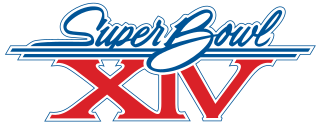
Super Bowl XIV was an American football game between the National Football Conference (NFC) champion Los Angeles Rams and the American Football Conference (AFC) champion Pittsburgh Steelers to decide the National Football League (NFL) champion for the 1979 season. The Steelers defeated the Rams by the score of 31–19, becoming the first team to win four Super Bowls. The game was played on January 20, 1980, at the Rose Bowl in Pasadena, California, and was attended by a Super Bowl record 103,985 spectators. It was also the first Super Bowl where the game was played in the home market of one of the participants, as Pasadena is 10 miles (16 km) northeast of Downtown Los Angeles.

Super Bowl XVIII was an American football game played on January 22, 1984, at Tampa Stadium between the National Football Conference (NFC) champion and defending Super Bowl XVII champion Washington Redskins and the American Football Conference (AFC) champion Los Angeles Raiders to determine the National Football League (NFL) champion for the 1983 season. The Raiders defeated the Redskins, 38–9. The Raiders' 38 points scored and 29-point margin of victory broke Super Bowl records; it remains the most points scored by an AFC team in a Super Bowl, later matched by the Kansas City Chiefs in Super Bowl LVII. This is the first time the city of Tampa hosted the Super Bowl and was the AFC's last Super Bowl win until Super Bowl XXXII, won by the Denver Broncos.
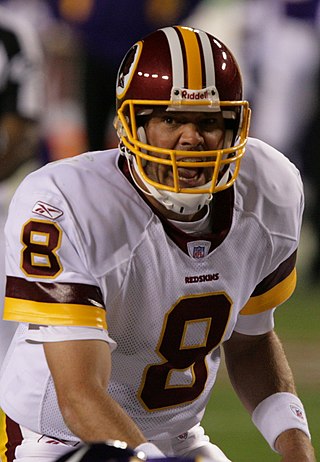
Mark Allen Brunell is an American football coach and former quarterback who is the quarterbacks coach for the Detroit Lions of the National Football League (NFL). He previously played in the NFL for 19 seasons, most notably with the Jacksonville Jaguars. For his accomplishments in Jacksonville, he was inducted to the Pride of the Jaguars in 2013.
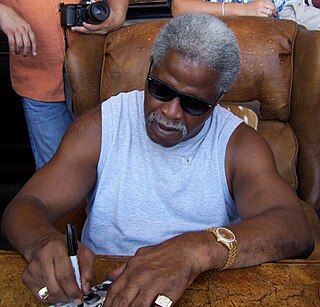
Earl Christian Campbell, nicknamed "the Tyler Rose", is an American former football running back who played in the National Football League (NFL) for eight seasons, primarily with the Houston Oilers. Known for his aggressive, punishing running style and ability to break tackles, Campbell gained recognition as one of the best power running backs in NFL history.

George Washington Rogers Jr. is an American former football running back who played in the National Football League (NFL) for seven seasons from 1981 to 1987. He played college football for the South Carolina Gamecocks, earned All-American honors, and won the 1980 Heisman Trophy. He was the first overall pick in the 1981 NFL draft, and he played for the New Orleans Saints and the Washington Redskins.
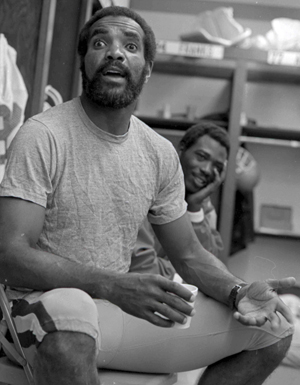
Calvin G. Hill is an American former professional football player who was a running back in the National Football League (NFL). He played for the Dallas Cowboys, Washington Redskins, and Cleveland Browns. He also played a season with The Hawaiians of the World Football League (WFL).

Hugh Edward McElhenny Jr. was an American football halfback who played in the National Football League (NFL) from 1952 to 1964 for the San Francisco 49ers, Minnesota Vikings, New York Giants, and Detroit Lions. He was noted for his explosive, elusive running style and was nicknamed "the King" and "Hurryin' Hugh". A member of San Francisco's famed Million Dollar Backfield and one of the franchise's most popular players, McElhenny's no. 39, is retired by the 49ers and he is a member of the San Francisco 49ers Hall of Fame.

Donald LeRoy Doll, also known as Don Burnside, was an American football player and coach.

Robert Donald Chandler was an American professional football player who was a wide receiver in the National Football League (NFL) for twelve seasons.

Thomas Lyle Flick is an American former professional football player who was a quarterback for seven seasons in the National Football League (NFL) with five teams. He played college football for the Washington Huskies, and is currently a corporate speaker on leadership and change.
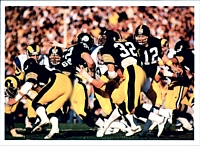
The 1979 season was the Los Angeles Rams' 42nd season in the National Football League (NFL), their 43rd overall, and their 34th in the Greater Los Angeles Area. It was the final season for the franchise in the Los Angeles Memorial Coliseum until 2016, as late owner Carroll Rosenbloom previously announced the Rams would move to Anaheim Stadium for the 1980 season.
Ralph Darrell Clayton is an American former professional football player who was a wide receiver for the St. Louis Cardinals of the National Football League (NFL). A native of Detroit, Michigan, Clayton played college football as a "wingback" for the University of Michigan from 1976 to 1979 and was the leading receiver for the Michigan Wolverines football team in both 1977 and 1978. After being selected by the New York Jets in the second round of the 1980 NFL draft, Clayton missed the 1980 NFL season due to injury. He later signed with St. Louis and appeared in seven games for the Cardinals during the 1981 NFL season.
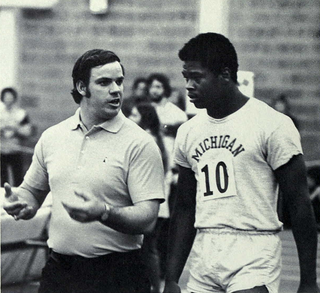
Russell Davis, III is a former American football player.

The 1964 Michigan Wolverines football team represented the University of Michigan in the 1964 Big Ten Conference football season. In their sixth year under head coach Bump Elliott, the Wolverines compiled a 9–1 record, won the Big Ten Conference championship for the first time since 1950, and defeated Oregon State in the 1965 Rose Bowl by a score of 34–7. The 1964 Wolverines defeated four teams ranked in the Top 10 in the AP Poll by a combined score of 82 to 17 and finished the regular season ranked No. 4 in both the AP and Coaches' polls. Although no post-bowl polls were taken in the 1964 season, Oregon State coach Tommy Prothro opined after watching game film from the Rose Bowl that the 1964 Wolverines were "the greatest football team he has ever seen."
The 1964 Rose Bowl was the 50th Rose Bowl Game, played on January 1, 1964. It featured the Illinois Fighting Illini and the Washington Huskies.
The 1981 Rose Bowl was the 67th Rose Bowl game and was played on January 1, 1981, at the Rose Bowl Stadium in Pasadena, California. The game featured the Michigan Wolverines beating the Washington Huskies by a score of 23–6. The game marked the first time Michigan Coach Bo Schembechler won a bowl game after seven prior bowl game losses.
Leon Calvin Murray is a former American football running back. He was selected by the Philadelphia Eagles the National Football League (NFL) in the fourth round of the 1981 NFL draft and played from 1981 to 1982 for the Eagles. He also played in 1983 for the Arizona Wranglers and in 1984 for the Denver Gold of the United States Football League (USFL).
The 1989 Freedom Bowl was a college football bowl game played on December 30 at Anaheim Stadium in Anaheim, California. The game featured the Washington Huskies of the Pacific-10 Conference and the Florida Gators of the Southeastern Conference, who were led by junior Emmitt Smith, a consensus All-American at running back.
Michael Anthony Joseph Jolly is a former American football player. He played professional football as a defensive back for the Green Bay Packers from 1980 to 1983. He also played college football for the University of Michigan from 1976 to 1979. He started at weak side cornerback for Michigan in 35 of 36 games from 1977 to 1979 and was selected as a first-team All-Big Ten Conference player in both 1978 and 1979.
Joe Steele is an American former football player and running back for the University of Washington Huskies from 1976 through 1979. During his college career, he set Husky records for most single season rushing yards, most career rushing yards, and most career touchdowns.
References
- 1 2 3 4 5 6 7 8 9 Florence, Mal (December 30, 1980). "Husky Star: For El Camino's Tyler, the Name is One of a Kind". Los Angeles Times : p. B1.
- ↑ "Toussaint Tyler". linkedin. LinkedIn Corporation. Retrieved October 3, 2015.
- ↑ "Rose Bowl won't decide national title this year". Lodi News-Sentinel : p. 13. December 30, 1980. Retrieved April 5, 2010.
- ↑ McKibben, Dave (December 11, 1992). "Defending Champ El Camino Has Westbrook in Its Corner Football". Los Angeles Times . p. 11.A.
- ↑ Schwartz, Fred (February 3, 1977). "Prep Notebook". The Modesto Bee . p. A-10. Retrieved February 8, 2010.[ permanent dead link ]
- 1 2 Hancock, Hec (March 6, 1977). "Blue chip bonanza". Tri-City Herald . p. 31. Retrieved February 8, 2010.[ permanent dead link ]
- ↑ Brown, Bruce (September 3, 1977). "Another View: Cougar Stars Boosted". Spokane Daily Chronicle : p. 11. Retrieved May 2, 2010.
- ↑ "Huskies Thrash San Jose State". Spokane Daily Chronicle : p. 29. September 19, 1977. Retrieved May 2, 2010.
- ↑ "Huskies remain in Rose Bowl race". Eugene Register-Guard . November 6, 1977. p. 4C. Retrieved February 8, 2010.
- ↑ "Michigan's Bowl Game History: 1978 Rose Bowl". Bentley Historical Library . Retrieved February 8, 2010.
- ↑ "Washington Survives Oregon". The Pittsburgh Press . October 22, 1978. p. D-10. Retrieved February 10, 2010.
- ↑ "Maryland, Navy continue winning; Surprises may be over". The Tuscaloosa News . October 30, 1978. p. 16. Retrieved February 10, 2010.
- ↑ Boyles, Bob; Guido, Paul (2008). The USA Today College Football Encyclopedia. New York City, New York: Skyhorse Publishing Inc. p. 1305. ISBN 978-1-60239-331-8.
- ↑ Green, Tom (August 22, 1979). "Huskies are big threat". Ellensburg Daily Record . p. 15. Retrieved February 10, 2010.
- ↑ "Red-hot Huskies wallop Utah 41–7". The Spokesman-Review . September 16, 1979. p. C1. Retrieved February 10, 2010.
- ↑ Missildine, Harry (September 22, 1979). "Huskies hope to stay out of Duck soup". The Spokesman-Review . p. 21. Retrieved February 10, 2010.
- ↑ "West: Army defense blitzes Stanford". Chicago Tribune . September 23, 1979. p. C8.
- ↑ "Huskies Call Up Their Reserves in 49–14 Victory". Los Angeles Times : p. C3. September 30, 1979.
- ↑ "Steele-led Huskies trample Beavers". The Spokesman-Review : p. C1. October 7, 1979. Retrieved February 10, 2010.
- ↑ Van Sickel, Charlie (October 18, 1979). "The Numbers Game". Spokane Daily Chronicle : p. 50. Retrieved February 10, 2010.
- ↑ "Huskies Lose the Ball Six Times, Then Lose, 26–14". Los Angeles Times : p. C7. October 21, 1979
- ↑ "Washington tops Texas, 14–7, in Sun Bowl". The New York Times : p. S6. December 23, 1979.
- ↑ "1979 Sun Bowl: Washington 14, Texas 7 Archived 2010-05-21 at the Wayback Machine ". Texas Longhorns. CBS Interactive. Retrieved February 11, 2010.
- 1 2 "Huskies tip 'Devils, move toward bowl [ permanent dead link ]". The Spokesman-Review : p. B3. November 2, 1980. Retrieved April 5, 2010.
- ↑ "Depth could be problem". Ellensburg Daily Record : p. 11. August 28, 1980. Retrieved February 20, 2010.
- 1 2 White, Gordon S. Jr. (November 24, 1980). "Huskies Worthy Entry for Pac-10; Stanford, California Early Picks Flick Throws for Three Scores Four Receivers Most of Time". The New York Times : p. C10.
- ↑ "Huskies pop Northwestern". The Tuscaloosa News : p. 10B. September 21, 1980. Retrieved February 20, 2010.
- ↑ "Huskies beat Beavers 41–6 [ permanent dead link ]". Tri City Herald : p. 35. October 12, 1980. Retrieved March 5, 2010.
- ↑ "Bruin's big day falls short". The Spokesman-Review : p. C3. October 15, 1980. Retrieved March 5, 2010.
- ↑ "Stanford, Washington in key battle". Spokane Daily Chronicle : p. 20. October 17, 1980. Retrieved April 5, 2010.
- 1 2 Boyles, Bob; Guido, Paul (2009). The USA Today College Football Encyclopedia 2009–2010. New York City, New York: Skyhorse Publishing Inc. p. 1358. ISBN 978-1-60239-677-7 . Retrieved April 5, 2010.
- ↑ "Devils at Washington". The Prescott Courier : p. 15A. October 31, 1980. Retrieved April 5, 2010.
- ↑ "Flick's flicks zap Arizona". Kingman Daily Miner : p. 11. November 9, 1980. Retrieved April 5, 2010.
- ↑ Florence, Mal (November 16, 1980). "USC Surrenders the Ball and Everything Else": Los Angeles Times : p. D1.
- ↑ Damer, Roy (January 3, 1981). "Michigan almost haunted again by 'phantom' TD". Chicago Tribune : p. A2.
- ↑ "1981 NFL Draft Listing". Pro-Football-Reference. Sports Reference LLC. Retrieved April 8, 2010.
- ↑ "Getting Ready". The Sumter Daily Item : p. 1B. May 21, 1981. Retrieved April 6, 2010.
- ↑ "Transactions". Ellensburg Daily Record : p. 17. June 23, 1981. Retrieved April 6, 2010.
- ↑ "1981 New Orleans Saints Statistics & Players". Pro-Football-Reference. Sports Reference LLC. Retrieved April 8, 2010.
- ↑ "1982 New Orleans Saints Statistics & Players". Pro-Football-Reference. Sports Reference LLC. Retrieved April 8, 2010.
- ↑ "Transactions". Reading Eagle : p. 22. August 30, 1983. Retrieved April 8, 2010.
- ↑ "Knee Surgery Sidelines Sipe for 2 to 3 Weeks". Philadelphia Inquirer . March 2, 1984.
- ↑ "Transactions". Ellensburg Daily Record : p. 11. August 14, 1984. Retrieved April 8, 2010.
- ↑ Boyle, John (March 10, 2006). "Names the same". The Seattle Times . Retrieved March 5, 2010.
- ↑ Peoples, John (October 1, 1994). "Amputation: 'Toll To Be Paid'". The Seattle Times . Retrieved April 5, 2010